Pickleball 101: The Fastest Growing Sport in 2024
If we were to ask you what the fastest growing sport in America is in 2024, what would you respond? Chances are good you wouldn’t answer “pickleball“, unless, of course, you are already among this game’s devotees. Despite what a big deal pickleball is becoming, loads of people still do not have a clue it exists!
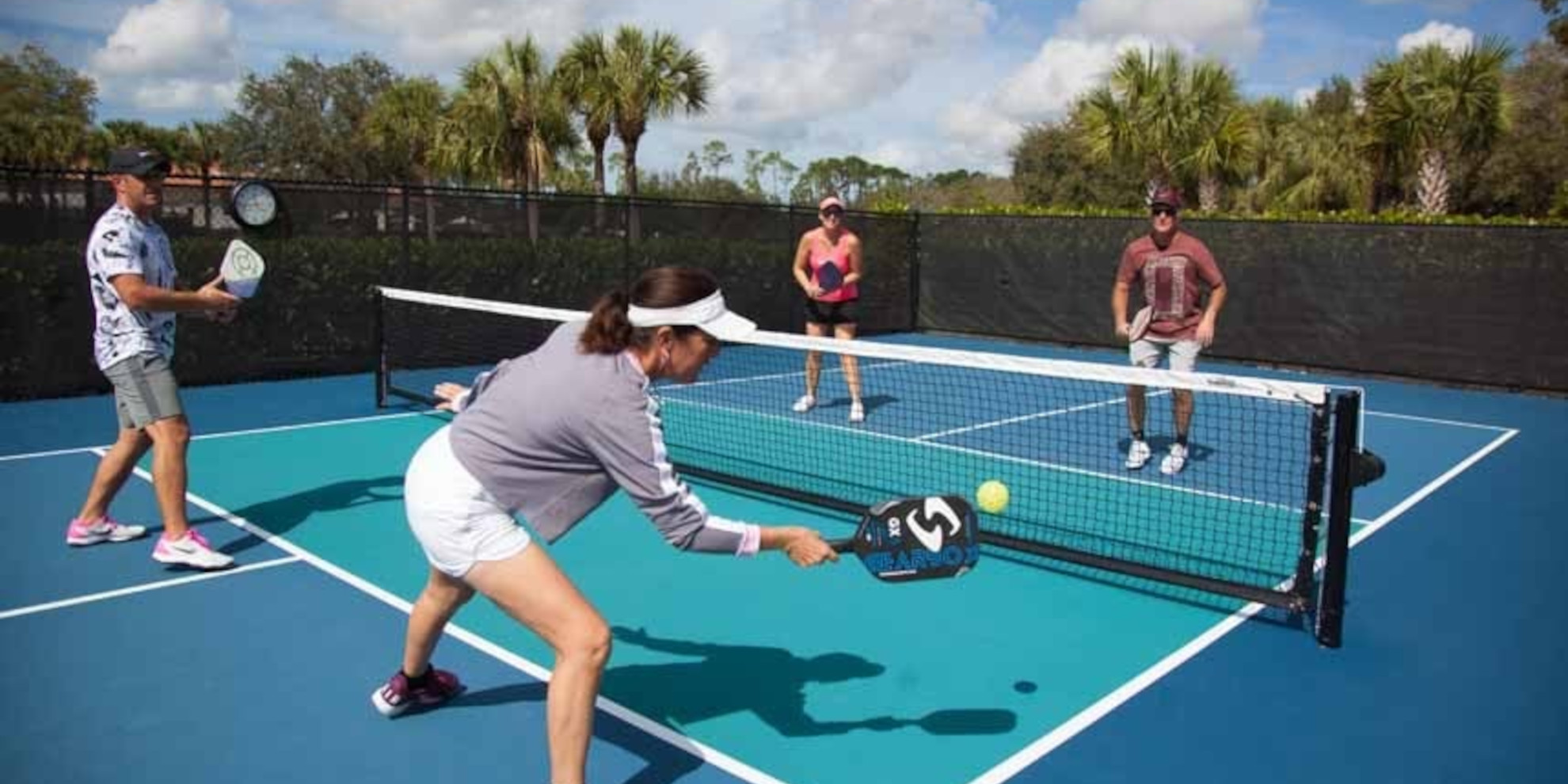
A game of Pickleball being played, from USSportsCamps.com
In this post, we are going to introduce you to pickleball, explaining exactly what it is and how it is played.
At the time of this writing, there is still no pickleball betting online, but we think there is a good chance that is going to change. If or when it does, we will update this post to tell you where you can wager on pickleball.
What the Heck is Pickleball?
Pickleball is a sport that is closely related to tennis, badminton and ping pong.
Why is this Sport Called “Pickleball”?
Pickleball is an undeniably odd name for a sport, which may leave you wondering how it came to be known by such a strange name.
Sports Illustrated explains, “Pickleball got its name from ‘pickle boat’ (a hastily assembled rowing crew), a nod to the paddle sport being cobbled together from parts of others: badminton, tennis, even Wiffle Ball. The moniker invited curiosity and derision in equal measures. But, as time passed and pickleball gained traction in sun-splashed, gated retirement communities from Palm Beach to Palm Desert, it became more addictive than Blue Bloods.
So, there you go. Unless you knew what a “pickle boat” was, you would have a pretty hard time figuring out this etymology on your own.
Just How Popular is Pickleball?
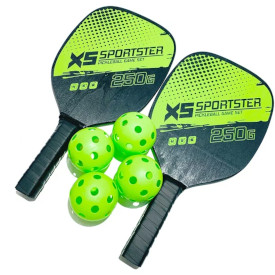
Hey guys! Check out these balls!
The growth of pickleball is so dramatic that even major news outlets are reporting on it. CNBC reported in January, “The pickleball boom is real. More than 36.5 million people played pickleball from August 2021 to August 2022, according to a new report by the Association of Pickleball Professionals released exclusively to CNBC. Earlier data pinned the participation rate of the sport at 5 million players in 2021.”
CNBC continues, “14% of Americans played pickleball at least once in that 12-month period. And over 8.5 million people played pickleball eight times or more.”
Even major professional athletes in other sports are starting to get excited about pickleball. Pickleball has enjoyed an influx of cash thanks to investments by Kevin Durant, Tom Brady, LeBron James and Patrick Mahomes.
In fact, there are even concerns that pickleball’s extremely fast growth spurt could cause problems for the sport, as discussed in Sports Illustrated.
As that post makes plain, there is already a ton of money in pickleball. And it seems unlikely that the feuding governing bodies (see the section on how pickleball is organized in this article) will be able to peacefully coexist in the long run.
On a random note, pickleball seems to be associated with a lot of injuries. The reason for this may have less to do with the sport and more to do with the age demographic involved in playing it. Pickleball attracts a lot of senior players, who simply are prone to injuries in the first place.
Younger people are starting to take an interest in pickleball, however, and it is developing broad appeal among all age groups.
Why is Pickleball So Popular?
So, why has pickleball taken off the way it has?
- For starters, this sport is fast and simple to learn
- Pickleball is accessible
- It is cheap to play pickleball
- People can socialize while playing pickleball
- The fast-paced sport is fun to watch
- Pickleball rose to popularity during the pandemic
You can quickly and easily start playing it or watching it. Even with no experience, you will be able to easily follow the action.
No matter what age you are, you can probably play pickleball. You do need to warm up properly to avoid injuries, as with other sports, but the game may be more approachable than some others for seniors and players with disabilities.
You will spend less on equipment to play pickleball than you would on some other racket sports. Additionally, pickleball courts are less expensive to build than tennis courts, which has led to many businesses installing them in recent years.
Owing to the smaller size of pickleball courts, people can easily chat while playing the sport. So, many people use it as a social opportunity.
Actually, the pace is not as frenzied as that of tennis, but it is still relatively fast. Whether you play pickleball yourself or not, you will have a great time betting on it.
It likely made a great social outlet for people who wanted to maintain social distancing and stay entertained during the lockdowns.
How is Pickleball Organized?

The head honchos of Pickleball. At least, they want to be.
Since pickleball is just now becoming a big deal, there is a bit of contention over how it should be organized. Here are the two international governing bodies you need to know about:
- International Federation of Pickleball (IFP)
- World Pickleball Federation (WPF)
The IFP and the WPF do not get along.
Unless things change a lot in the coming years (which they easily could), we are guessing a lot of the early betting action in the US will be on these domestic tours:
- Professional Pickleball Association (PPA)
- Association of Pickleball Professionals (APP)
- The US Pickleball National Championship
- The US Open Pickleball Championships
Even though there is still debate about how best to organize professional pickleball, it may surprise you to know that the history of pickleball tournaments dates back many decades. It is believed that the first formal event was a championship in Washington state that took place in 1976.
Before pickleball was organized at the pro level, it was organized at the amateur level by the United States Amateur Pickleball Association (USAPA). That organization’s history dates back to 1984, and it was they who organized the first doubles tournament and printed the original rulebook for the sport.
How is Pickleball Played?
Now that you know more about how pickleball is organized (for now), let’s explain the rules of this game. Here are the basics of how the sport is played:
- Court may be indoors or outdoors
- The court must measure 44′ long x 20′ wide
- Players use a paddle to strike the ball
- The ball is hollow and perforated
- In the middle of the court, there is a 34″ high net
- Both players attempt to return the ball across the net each time it crosses to their side
- Players cannot hit the ball immediately; first, they need to wait for it to bounce in the “Kitchen” on their side, which is a special zone measuring 7 feet. Note that pickleball balls do not bounce as high as tennis balls
- A point can only be scored by the player who served
- There are singles and doubles formats for pickleball
- If the team that served commits a fault, no one scores
- If the team that did not serve commits a fault, the team that served scores a point
- There are a variety of events that constitute a “fault.” Examples include striking the ball and failing to get it across the net, volleying from the non-volley zone, and so on. You will want to look up a full list of faults before you start watching and betting on pickleball
Of course, those are just the basics; you will need to read through the rules in detail prior to betting so you understand what you are wagering on. As you can see, however, the sport is a lot like tennis. If you are used to betting on tennis, it should be easy to transition into betting on pickleball.
Can You Bet on Pickleball Online? (Not Yet)
We have yet to see any online sportsbooks accepting wagers on pickleball. But the moment that changes, we will update this section with our recommendations.
Why We Want Pickleball Betting
Normally at this point in one of our 101 guides, we go over top reasons to bet on a sport. Since we cannot yet wager on pickleball, let’s explain why it would be awesome if we could:
- Pickleball Is Novel And Exciting
- It Is Easy To Understand Pickleball
- You Can Transfer Knowledge From Tennis And Table Tennis
- You Can Try Playing The Sport Yourself
- It May Be Easy To Find An Edge
As a bettor, you might be getting bored of the same old routine, and find yourself longing for something new and different to bet on. Or perhaps you are just frustrated during the off-season waiting for the sport you usually bet on to resume. Either way, pickleball betting would break up the monotony, much in the way that table tennis betting did during the pandemic.
If you find other sports dauntingly complex, pickleball will be a breath of fresh air. After you learn the rules, you will be ready to start betting.
Bettors with experience wagering on either of these sports will be ready to dive right in with pickleball. Of course, pickleball is a bit different from either of these sports, so you will need to adjust your strategies to account for those differences.
Since pickleball is easy to learn and does not require expensive equipment, most people can give it a go. You can learn a lot about a sport by playing it, which can help you bet more profitably. So, that is yet another reason pickleball is ideal for bettors.
Even though pickleball is growing rapidly, we would be surprised if it overtook the major sports. So, sportsbooks probably will not invest as many resources into handicapping for it. That gives you the opportunity to hone an edge.
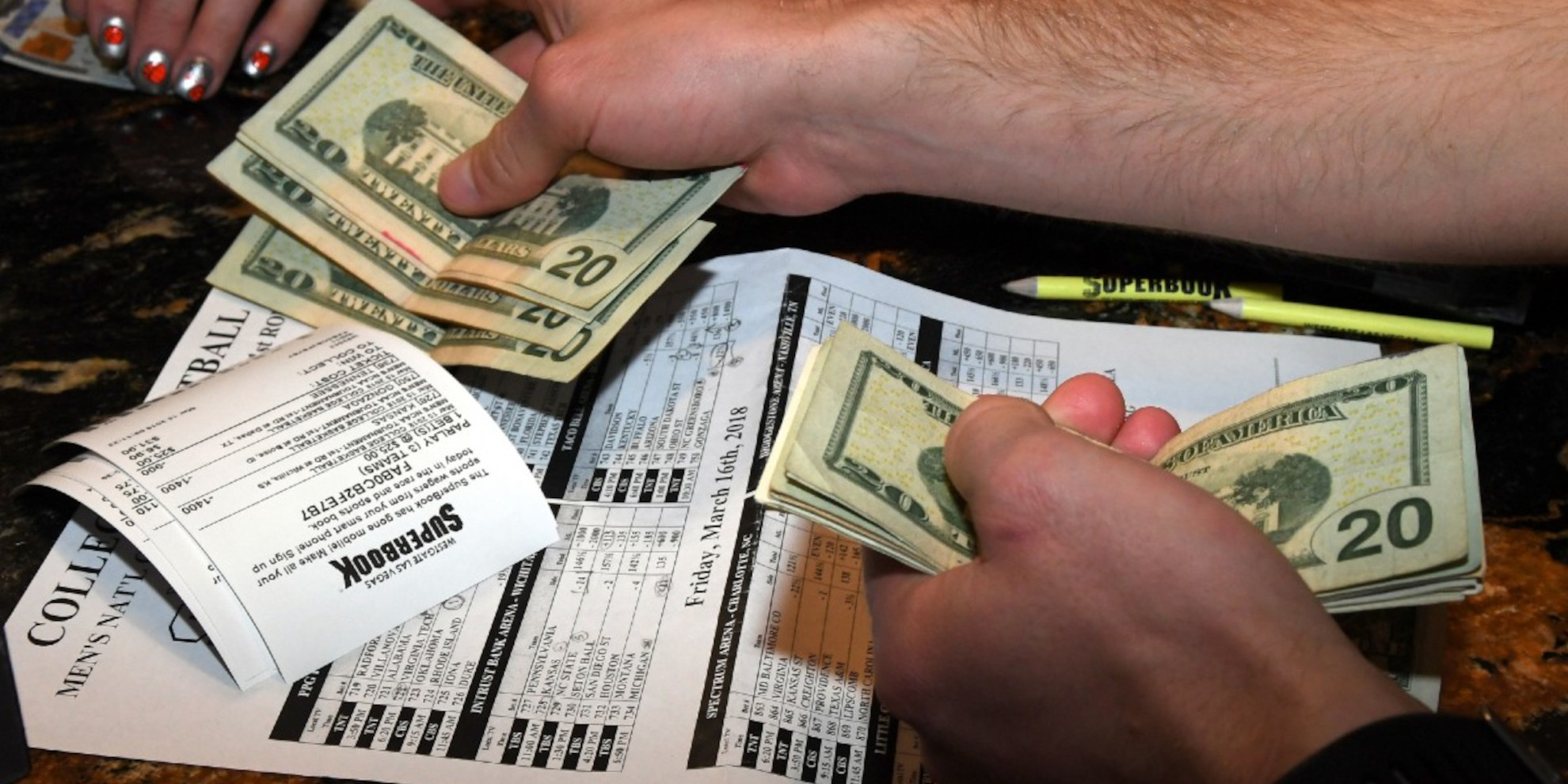
This. This on Pickleball. This is what the people want.
The people around here, anyway!
Types of Pickleball Bets
We do not yet know exactly what bets will be offered on pickleball. But it is easy to make an educated guess. Here are the types of wagers that we hope someday soon we will be able to make on pickleball:
- Straight bets:
- Handicap bets:
- Futures:
- Accumulator bets:
- Props:
- Live bets:
A straight wager is when you name which player or team you believe will win a pickleball match.
With a handicap bet, points are added or subtracted, giving two unevenly matched opponents more level odds. So, you become more likely to win a bet on the underdog than you otherwise would, and less likely to win a bet on the favorite (though that wager will likely pay better if it is a winner).
A futures bet is on the outcome of a pickleball event that is scheduled weeks or months away.
These are bets like parlays that entail adding more than one selection to your betting slip. If every selection you pick wins, then you win the payout for the accumulator. If any of the selections fail, you do not win the payout.
You may have the chance to place bets that do not relate directly to the outcomes of pickleball matches. These are “proposition bets,” or “props.”
Since live betting is popular with tennis, we are guessing it will be one day with pickleball as well. Live betting is where you place wagers on events as they are taking place.
What Strategies Would Work for Pickleball Betting?
Since pickleball betting is not yet widespread, it is hard to offer much in the way of specific strategies. But here are a couple of pieces of advice that may help you bet profitably on this sport.
- Research the players.
- Consider the role of weather conditions.
- Check for injuries.
- Shop for value.
As with when you are betting on tennis, ping pong, or other sports, you should do as much research as you can on the players in the event on which you are betting. Check their recent stats, historical stats, and head-to-head data. Take a look at any news or social media that gives you further insights.
Sometimes, professional pickleball is played outdoors. When that is the case, you need to think about how the weather will impact the players. Is it especially hot or cold? Really bright? Will the climate conditions favor one player over another?
It can be easy to overlook the possibility of injuries in a sport that is as accessible as pickleball. But pickleball injuries happen pretty frequently, especially among older players.
So, before you place bets on an upcoming pickleball match, try to find out whether either of the participants are injured, and how that might affect the way they play.
Our final recommendation is that when you bet on pickleball, you check the odds at multiple sports betting sites. Place your bets wherever you find the best value in the odds.
When you are a member of multiple sportsbooks, you also can claim more than one bonus offer. That can help you to extend your bankroll while you are betting on pickleball.
If you would like to start betting now on something else while you’re waiting for Pickleball to show up, why not check out BetOnline where you can get yourself a Bonus of up to $1000 just for signing up with the code BET1000!
Pickleball Glossary
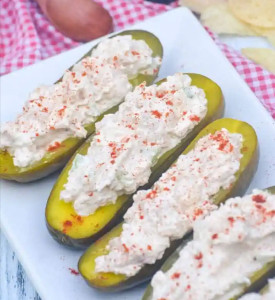
While putting up this page I found a recipe for “Chicken Salad stuffed Pickle Boats”.
Guess what I’m making this weekend!
Let’s go over some common terms that are used in the sport of pickleball. Of course, this is not a full glossary—but it should be enough to at least get you started.
- Ace:
- Approach shot:
- Backcourt:
- Baseline:
- Carry:
- Centerline:
- Champion shot:
- Chop:
- Cross court:
- Dead ball:
- Dig:
- Dillball:
- Dink shot:
- Double bounce:
- Double hit:
- Down the line:
- Drive:
- Drop shot volley:
- Erne:
- Falafel:
- Fault:
- Flat face:
- Groundstroke:
- Kitchen:
- Let:
- Line calls:
- Lob:
- Midcourt:
- Non-volley zone:
- “OPA!”:
- Paddle:
- Painting the line:
- Passing shot:
- Permanent object:
- “Pickle!”:
- Pickled:
- Pickledome:
- Pickler:
- Rally:
- Receiver:
- Reset:
- Second serve:
- Serve:
- Service court:
- Service out side scoring:
- Shadowing:
- Sideline:
- Slice:
- Smash:
- Stacking:
- Technical foul:
- Transition zone:
- Two bounce rule:
- Volley:
- Volley llama:
- Unattackable ball:
If a player serves and their opponent fails to make a return, then the server wins a point with an “ace.”
A player making this type of shot approaches the net while they strike the ball.
This name refers to the part of the court that is by the baseline.
The back end of the court has a line called the “baseline.”
If the motion of the paddle keeps the ball in contact with it for part of a swing, it is referred to as a “carry” shot.
This is the line that divides the court in half.
When the ball bounces two times in the non-volley zone, it is known as a “champion” shot.
This is a technique which can be used to apply backspin.
This is the part of the court on a player’s opponent’s side that is diagonally across from them.
If a ball is not in play anymore, we refer to it as a “dead ball.”
A player trying to reset the ball may engage in a shot called a “dig.”
The opposite of a dead ball is a “dillball,” which is a ball that remains in play after bouncing one time within bounds.
One of the most well-known types of shots in pickleball is called a “dink.” It refers to when a ball is sent in an arc above the net. It then lands in the non-volley zone on the other side.
If a ball bounces twice before a player returns it, they lose a point, and it is called a “double bounce.”
This is when the ball is hit two times before it is sent back to the opponent’s side of the net. It is common in doubles, but can occur in singles as well.
If you hear someone explain that a shot went “down the line,” they are referring to it moving along the sideline.
This is a shot that “drives” the ball into the backcourt across the net. It is a low shot.
This is a type of short return that can work well when one’s opponent is close to the baseline. “Drop spin” is a similar technique.
An “erne” is a special move where a player leaps and clears the NVZ without touching down with their feet when smashing.
If a player does not strike the ball with much power, the result may be referred to a “falafel,” or sometimes a “dead paddle.”
Any rule violation is referred to as a “fault.”
When the paddle’s surface and the net are parallel to one another, it is referred to holding the paddle with a “flat face.”
If the ball has bounced once and then you hit it, that is a “groundstroke.” If this is done right after the bounce (not after the ball has had time to go higher), it is specifically called a “half-volley groundstroke.”
One of the odder terms used in pickleball is “the kitchen,” which simply refers to the non-volley zone.
If the ball strikes the net cord after serving and then ends up in the service court, it is a “let serve.” The same rule applies as in tennis; the serve is played again.
These are shouts from the players regarding inbound bounces or bounces that were out of bounds.
“Lobbing” the ball over the net is precisely what it sounds like; it is an attempt to get it all the way to the back of the opposing side of the court with a deep, high return.
The part of the court that is located between the baseline and the non-volley zone is the midcourt.
As the name suggests, one may not volley while in the non-volley zone (NVZ). This zone extends 7′ to both sides of the net.
You may hear people calling this out at pickleball games. It signals the start of open volleying following the hitting of the third shot.
This is the technical name for what pickleball players use to hit the ball; it is sometimes casually called a “racket,” but “paddle” is more correct.
If a ball lands on the line, someone may say that the player “painted the line” successfully.
This type of shot is designed to pass the other player by.
This phrase actually refers to plenty of objects you might not think of as “permanent,” per se. Basically, if it can stop the ball, it is a “permanent object.” Obvious examples include the net posts or walls. But people count too.
When players yell this, it just means they are going to serve.
Players are said to have been “pickled” if they did not score any points in a match.
Championship games in the sport of pickleball are said to take place at the “Pickledome.”
Zealous fans of the sport of pickleball are sometimes called “picklers” (they may refer to themselves as such too).
After the serve, a “rally” goes on until there is a fault. That ends the rally, after which there will be another serve to begin the next rally. Whichever team won the previous rally is the one that will serve next.
When a player serves, they do so toward the player who is on the other side of the court from them diagonally. That player is the “receiver.” They need to try and return the ball.
If the ball is being sent back and forth particularly hard, a player may “reset” it by dinking it from the kitchen.
If a team faults on their initial serve, they may make a second serve.
This is the initial hit that starts a rally. One thing that is useful to know about pickleball serves is that they are always underhand.
The part of the court that is defined by the non-volley line, the sideline and the baseline is the service court.
This refers to a scoring practice where the side that serves is the only one that can score. It is in widespread use for pickleball.
When players on the same team move together “as one”, they are “shadowing” each other.
This is the line that separates out of bounds from the part of the court that is valid for play.
A player can apply back spin using this type of chop shot.
Another word for this type of shot is “overhead,” which describes it pretty well; it is a shot that a player takes above their own head.
When a team in doubles starts in an awkward position, and then changes position once play begins, it is called “stacking.”
This is different from a fault, and grants a point to the opposing team. It generally is a punishment for poor conduct.
Between the non-volley zone and the baseline, you will find the transition zone.
While volleying is permitted in pickleball, it cannot happen until the third hit. Before that, the ball has to bounce twice.
This is a hit that does not require waiting for a bounce.
If a player strikes the ball in the NVZ, they have committed a fault called a “volley llama.”
This is a ball with a low bounce that does not allow for an attack.
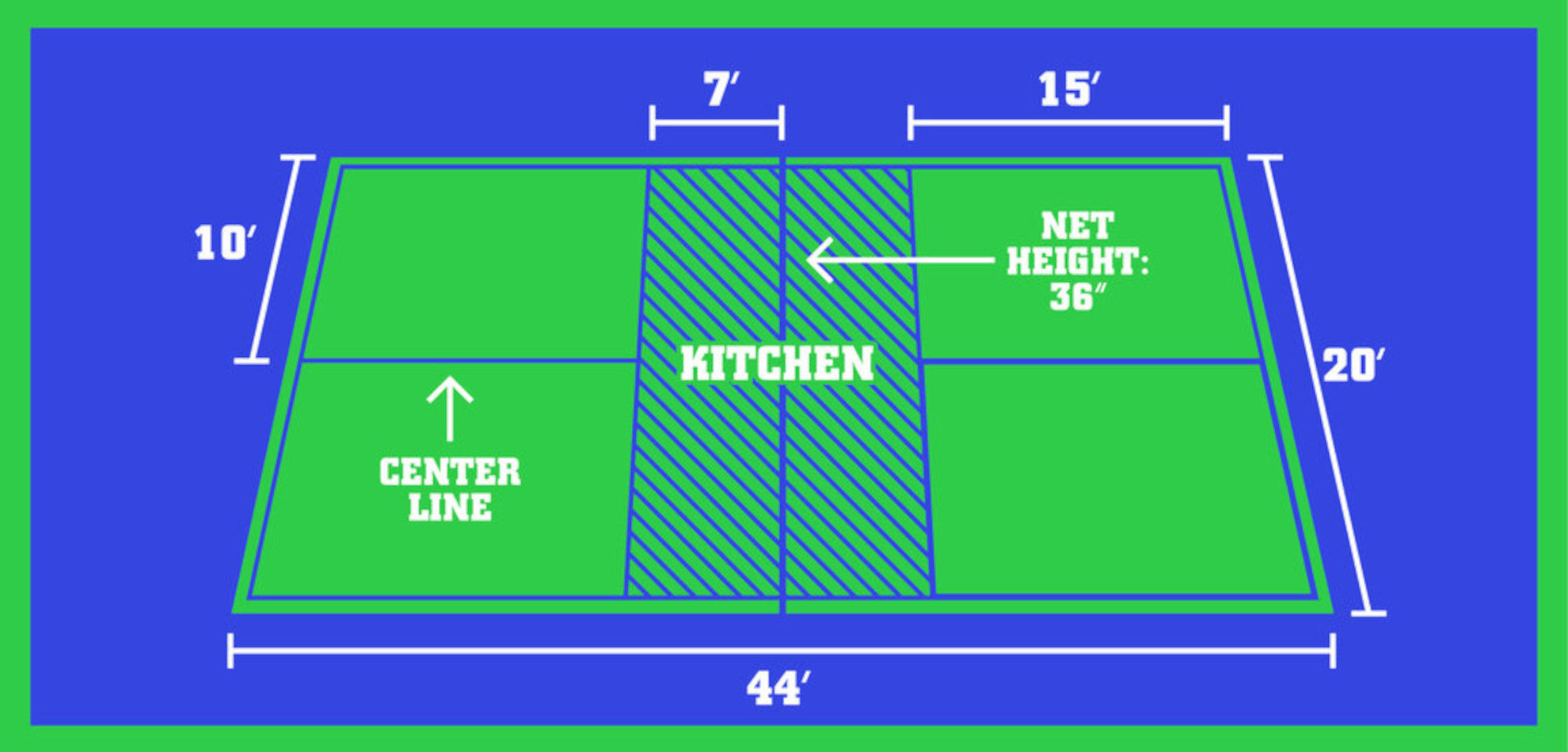
The exact Pickleball court dimensions, taken from Pickleball University.
(Not an accredited university. I checked.)
Check Back with Us Soon for Pickleball Betting
That wraps up our introduction to pickleball! You now know a lot more about this sport so see if you can find some chances to watch it or even participate in it!
In the future, if pickleball keeps skyrocketing in popularity, it seems likely you will be able to bet on it online. Check this post again in the future. We will update it with our top recommended sportsbooks for pickleball when that happens!
Don’t Go Pickling Without Reading These As Well


